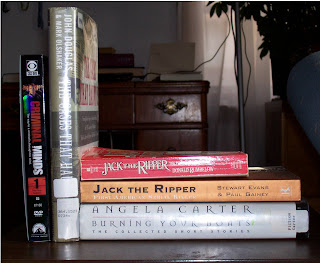 I do a lot of nonfiction reading based on TV I like to watch. (Everything I know about the French Revolution is on account of Richard E. Grant and his amazing blue eyes.) So when I got hooked on Criminal Minds, and then found out that one of the early FBI profilers had written a book including a section on Jack the Ripper, I knew I had to read it. (I may or may not have been imagining Dave Rossi reading sections of it. I'm sure the folks who write Criminal Minds were.)
I do a lot of nonfiction reading based on TV I like to watch. (Everything I know about the French Revolution is on account of Richard E. Grant and his amazing blue eyes.) So when I got hooked on Criminal Minds, and then found out that one of the early FBI profilers had written a book including a section on Jack the Ripper, I knew I had to read it. (I may or may not have been imagining Dave Rossi reading sections of it. I'm sure the folks who write Criminal Minds were.) This book was a step above a lot of the trashy true-crime stories I've read, mostly because it's coming from a very different perspective than most true-crime books: rather than playing on your sympathy with the victims, as a criminal profiler the writer is trying to get inside the heads of the criminals. It comes across as much less cheap emotional manipulation, while at the same time it almost makes the crimes seem more horrific, since the way Douglas and Olshaker describe the crime scenes puts you in the place of the murderer.
Unfortunately the weakest part of the book was the last, the long chapter on the JonBenet Ramsey case. Douglas had been involved in consulting on the case, and apparently his opinions were rather unpopular (I was twelve at the time this was in the news, so I couldn't say one way or the other). He spends a lot of time defending himself, and the politics of the thing, while probably necessary, are an unwelcome intrusion. Still, I liked the rest of it, and I think I'll probably pick up more of his books in the future.

As you can see, I could have gone a few ways with this; I'm something of a fan of Ripperologists, so I have a small collection of books on Jack the Ripper myself. Douglas dismissed the theory in Jack the Ripper: The First American Serial Killer by Stewart Evans and Paul Gainey pretty effectively, so I thought about reading that book again, but the next chapter on Lizzie Borden reminded me of one of my favorite short stories: Angela Carter's "The Fall River Axe Murders." I had some time in between appointments today, so I went down to the main library branch and picked up Burning Your Boats (and three other books as well. It's a good thing I prefer browsing libraries to bookstores).
Forwards: Angela Carter: Burning Your Boats



